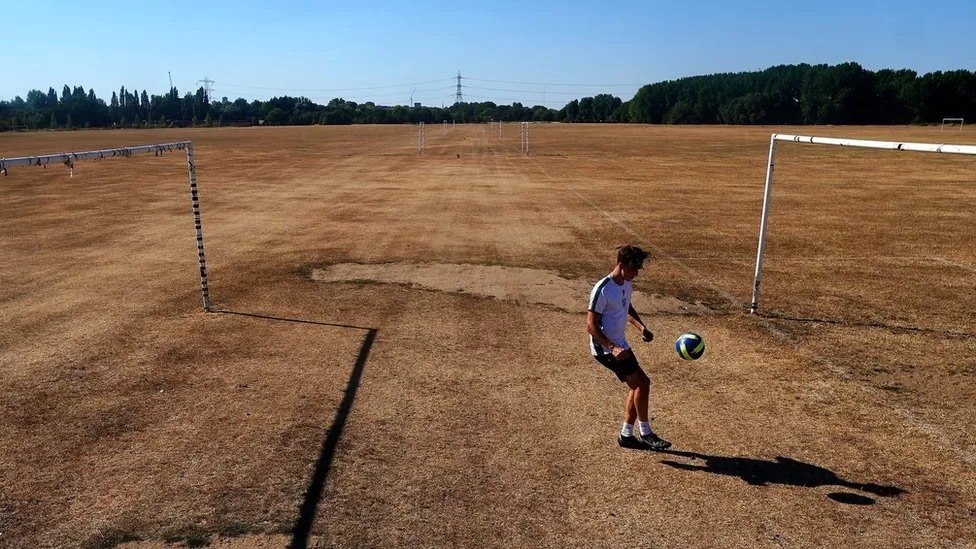Another hosepipe ban begins on Friday, as an amber extreme heat warning, low water levels and tinder dry conditions continue across much of the UK. South East Water, which has 2.2m customers in Kent and Sussex, said it had “no choice” after the driest start to the year in England since 1976. The government is expected to declare a drought covering many areas of England on Thursday, BBC News has been told. Hampshire and the Isle of Wight are already under a hosepipe ban. Thames Water and Yorkshire Water are also set to follow suit and announce similar measures.
The National Drought Group – which is made up of government and agency officials, water companies and groups including the National Farmers’ Union (NFU) – is due to discuss the prolonged dry weather later. Drought is decided area by area, and if it is declared the government and water companies will launch their plans to deal with it. This is expected to include hosepipe bans and taking more water than usual from rivers. Wales Drought Liaison group, including environment, health and water professionals, is also looking at the effect of the prolonged dry weather. The ongoing dry conditions, combined with July’s record-breaking heatwave, have depleted rivers, reservoirs and aquifers.

Drought declaration expected
Since late July the UK has officially been in what is called “prolonged dry weather” – the stage before a drought is declared. The government had already said if this dry picture continues – which it has – then drought is likely to be declared. What will determine the decision is the hydrological position across the country – how much water there is around. The Department for Environment, Food and Rural Affairs (Defra) and the Environment Agency will be asking the other members of the National Drought Group about rainfall, river flows, groundwater levels, reservoir levels and soil moisture.
They will then ask how that is likely to impact the public water supply, how it will affect other people using water like businesses and agriculture and of course they will want to know what the impact on the environment is likely to be. BBC News has been told that Defra believes there could be serious impacts to some or all of these and will declare that parts of the UK are in a drought.
South East Water is asking people to observe the ban on using a hosepipe to water plants, wash the car and fill a paddling pool. The ban also applies to anything which serves the same purpose as a hosepipe such as sprinklers and irrigation systems or pressure washers. Rule-breakers could be hit with a £1,000 fine. The firm said its underground water aquifers were below average for the time of year across Kent and Sussex and its raw water reservoirs were also at a lower level.
Chief executive David Hinton said: “We are taking this step to introduce temporary restrictions on the use of hosepipes and sprinklers to make sure we have enough water for our customers’ essential use, ensure we can serve our vulnerable customers and to protect the local environment. “By taking this action now we will be able to reduce the amount of water we take from already stressed local water sources.”
Meanwhile, a four-day amber extreme heat warning is in place for southern and central England and parts of eastern Wales until Sunday, with warnings that the high temperatures are likely to impact health and cause travel disruption. Met Office chief meteorologist Andy Page said: “Persistent high pressure over the UK means temperatures have been rising day-on-day through this week and it is important people plan for the heat.
“Temperatures are expected to peak at 35C on Friday and possibly 36C over the weekend.”We will also see increasingly warm nights, with temperatures not expected to drop below the low 20s for some places in the south.”Temperatures are forecast to be lower early next week with heavy showers and thunderstorms likely in some areas. Heatwaves are becoming more likely and more extreme because of human-induced climate change.
Research institute UK Centre for Ecology and Hydrology (UKCEH) said it would require “exceptional” rainfall over the next one to three months to bring river, reservoir and groundwater levels back up to normal. But scientists have warned bouts of heavy rain after a prolonged period of hot weather could cause flash flooding.
Robert Thompson, a professor of Meteorology at the University of Reading, said: “the ground has effectively become like urban concrete” and will not absorb water quickly enough to cope with long showers. He told BBC News: “If you put water on the ground now, it doesn’t absorb in, it floats off the top. If we get lots of rain now, it will sit on the surface, meaning there will be lots of water on the surface all at once. “We need light drizzly rain after a bout of hot weather, not heavy rain, otherwise there’s a danger of flash flooding because the water can’t get into the ground,” he added.
![]()





